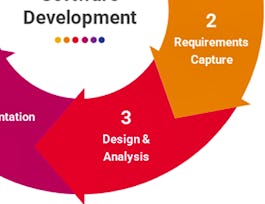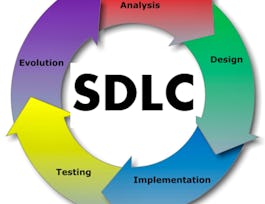Software Development Life Cycle (SDLC) is the process of developing software through planning, requirement analysis, design, implementation, testing, and maintenance. This course focuses on the implementation and testing phases of SDLC, and you will examine different software development processes for large software systems development, and understand the strengths (pros) and weaknesses (cons) of different software development processes. You will also encounter defensive programming techniques to prevent software bugs during implementation, and learn how to test your system thoroughly using different types of test cases.


Software Engineering: Implementation and Testing
This course is part of Software Engineering Specialization
Taught in English
Some content may not be translated

Instructor: Kenneth W T Leung
7,416 already enrolled
Included with 
Course
(46 reviews)
Recommended experience
Skills you'll gain
Details to know

Add to your LinkedIn profile
7 quizzes
Course
(46 reviews)
Recommended experience
See how employees at top companies are mastering in-demand skills

Build your subject-matter expertise
- Learn new concepts from industry experts
- Gain a foundational understanding of a subject or tool
- Develop job-relevant skills with hands-on projects
- Earn a shareable career certificate


Earn a career certificate
Add this credential to your LinkedIn profile, resume, or CV
Share it on social media and in your performance review

There are 7 modules in this course
Welcome to the first module of this course! In this module, you will learn: (1) The tasks involved in software development. (2) The processes involved in Software Development Life Cycle (SDLC).
What's included
3 videos1 reading1 quiz
In this module, you will learn: (1) Different software development processes, including Waterfall, Code-and-Fix, Prototyping, Spiral, Phased-Released, Agile, Extreme Programming, Continuous Integration, Scrum, and Unified Process.
What's included
3 videos3 readings1 quiz
In this module, you will learn: (1) The purpose and the major activities of implementation. (2) Defensive programming techniques to prevent software bugs during implementation.
What's included
3 videos3 readings1 quiz
In this module, you will learn: (1) Different techniques for debugging. (2) Configuration management to manage, control and monitor changes to life cycle artifacts.
What's included
2 videos1 reading1 quiz
In this module, you will learn: (1) The purpose of testing. (2) Design tests that have the highest likelihood of finding defects with the minimum amount of time and effort. (3) What is White Box testing. (4) Revealing subdomains for Basis Path Testing.
What's included
3 videos3 readings1 quiz
In this module, you will learn: (1) Revealing subdomains for Condition Testing, Loop Testing, and Data Flow Testing. (2) What is Black Box testing. (3) Revealing subdomains with equivalence partitioning. (4) Revealing subdomains for Boundary Testing.
What's included
3 videos3 readings1 quiz
In this module, you will learn: (1) How to perform tests. (2) How to evaluate tests. (3) Deriving test case for Acceptance Testing.
What's included
3 videos3 readings1 quiz
Instructor

Recommended if you're interested in Software Development

The Hong Kong University of Science and Technology

University of Minnesota

Yale University
Why people choose Coursera for their career




Learner reviews
Showing 3 of 46
46 reviews
- 5 stars
69.56%
- 4 stars
21.73%
- 3 stars
4.34%
- 2 stars
2.17%
- 1 star
2.17%
Reviewed on Nov 24, 2022
New to Software Development? Start here.

Open new doors with Coursera Plus
Unlimited access to 7,000+ world-class courses, hands-on projects, and job-ready certificate programs - all included in your subscription
Advance your career with an online degree
Earn a degree from world-class universities - 100% online
Join over 3,400 global companies that choose Coursera for Business
Upskill your employees to excel in the digital economy
Frequently asked questions
Access to lectures and assignments depends on your type of enrollment. If you take a course in audit mode, you will be able to see most course materials for free. To access graded assignments and to earn a Certificate, you will need to purchase the Certificate experience, during or after your audit. If you don't see the audit option:
The course may not offer an audit option. You can try a Free Trial instead, or apply for Financial Aid.
The course may offer 'Full Course, No Certificate' instead. This option lets you see all course materials, submit required assessments, and get a final grade. This also means that you will not be able to purchase a Certificate experience.
When you enroll in the course, you get access to all of the courses in the Specialization, and you earn a certificate when you complete the work. Your electronic Certificate will be added to your Accomplishments page - from there, you can print your Certificate or add it to your LinkedIn profile. If you only want to read and view the course content, you can audit the course for free.
If you subscribed, you get a 7-day free trial during which you can cancel at no penalty. After that, we don’t give refunds, but you can cancel your subscription at any time. See our full refund policy.


